The learning journey and how to succeed
I believe that this cycle is one of humanity's greatest abilities and think it should be studied, understood and encouraged in all. Nothing I cover here should really be a surprise, but I find it’s always good to consult and remember this when the going gets tough. After all, if you can learn how to learn, you can do anything, right? But no-one has ever said it would be easy.
How to learn something
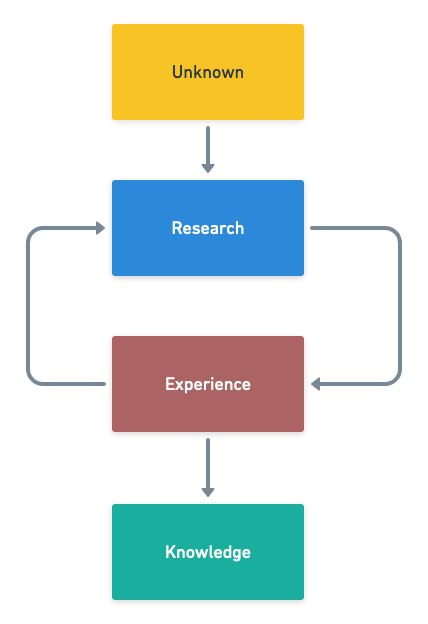
Let us cover the basic principle of learning as it’s the foundation of everything we do.
- Pick a topic to learn
- Research it:
- Who can you talk to?
- Where can you find out about a topic?
- What resources can you utilize?
- Experience it:
- Apply the learning from your research in real life, experience it physically, mentally and emotionally.
- By repeating steps 2 & 3, you gain understanding about the topic and therefore knowledge and eventually wisdom.
Looks easy enough right? In a sense it is, but of course the more complex or difficult the topic is, the more effort, commitment and persistence is required to obtain understanding and knowledge about it.
Diminishing returns and how to become a master of a topic
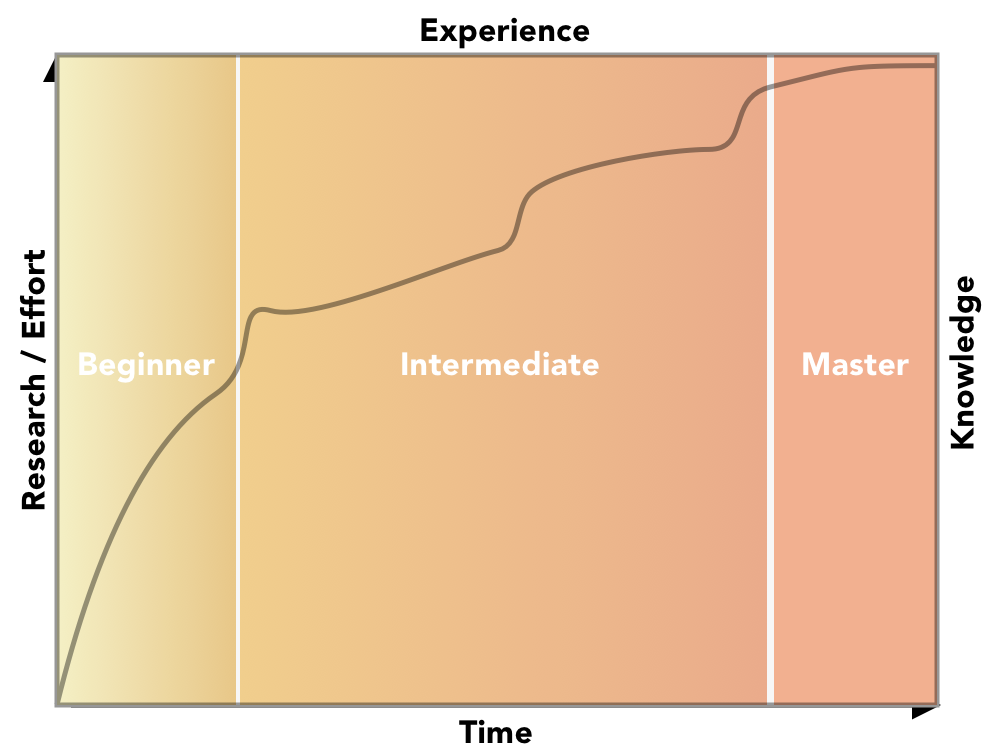
This won’t be a smooth curve, learning typically comes in bursts with periods of churn.
In the beginning of any learning cycle, you will naturally make bigger returns for your efforts than further on, which requires far more time and effort to return smaller gains.
For example, if you are learning how to play basketball, you can quickly learn how to throw a ball at the basket, but it will take a lot more effort and practice to become good at scoring consistently. And to actually master it and play in the NBA, it will require you to invest a huge amount of time and effort to get to and maintain that level of skill. And even then, you only improve very slightly after working on it all year.
Problem solving
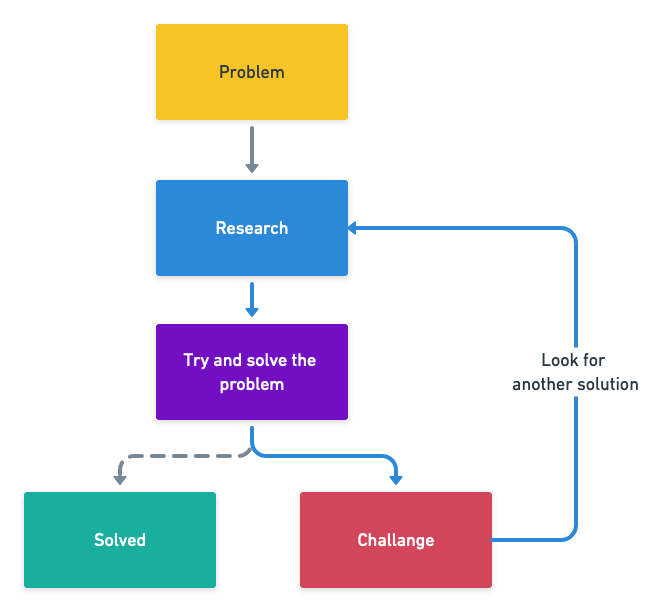
- Choose a problem to solve
- Research the problem:
- Can the problem be broken down into parts, or steps?
- Has anyone else had this problem or parts of this problem before? If so, how did they solve it/them?
- Try to find a solution and:
- Face many challenges - the harder the problem, the more challenges you will face:
- Typically you will ‘fail’ more often than you will have success - this is normal and should be expected. In fact, you learn to be very suspicious of it if it ‘just works’ first try…
- Create a feedback loop by feeding the learning from your challenges back into the next round of research. What worked? What didn’t work? What don’t you understand?
- Solved (typically you only solve a problem after many challenges)
A key point I need to make here is we are mostly taught that not achieving the desired goal or end, is a failure. And your a loser for even trying and so on. This has to be one of the most stupid social pressures we have, because without trying to reach impossible goals we would literally be dead.
Innovation and progress comes from people trying to overcome huge challenges and as anyone who works in this space knows, you almost NEVER end up where you set off for initially. But in no way is that a failure - it's just part of the process because you cannot understand what the end goal truly is until you get there. How can you, you don't know what it is yet - but you are inspired by the idea of what you think it is - and this is something truly fascinating about us humans, is that we have the ability to imagine what it would be like to understand something before we actually do. Isn't that amazing? I think so.
So I call almost all ‘failures’, ‘challenges’ - because that's what they truly are. I don't think you fail until the time you run out of all possible options to solve a problem or you are unable to turn it into something else.
“I give up, it's too hard and I can't see how to use it for anything - never talk to me about this again!” - is probably a ‘failure’, but even then, you will have these sometimes and you need to know when to stop pouring wasted effort into a dead project and just go do something else for a while. You're stuck and sometimes you just need a break, or maybe even a break forever - but you will take the learning from this experience and are far less likely to do this again because you have experienced this particular challenge. So would you truly call that a failure? Or just part of your journey to success?
“This isn't what I was aiming for and I haven't solved the initial problem yet, but look at how you could use this for X? And we haven't even tried Y or Z yet - ahh so much to do and not enough time!” - is a sign of healthy learning. The hard part is to not get distracted by all the pretty lights that come spinning off - make notes, focus on your goal and come back to these later if they don't directly help you solve your problem.
How to generally succeed at something
Everyone has a different understanding of what success means for themselves, so I'm going to massively generalize and boil the process down to keep it simple and direct.
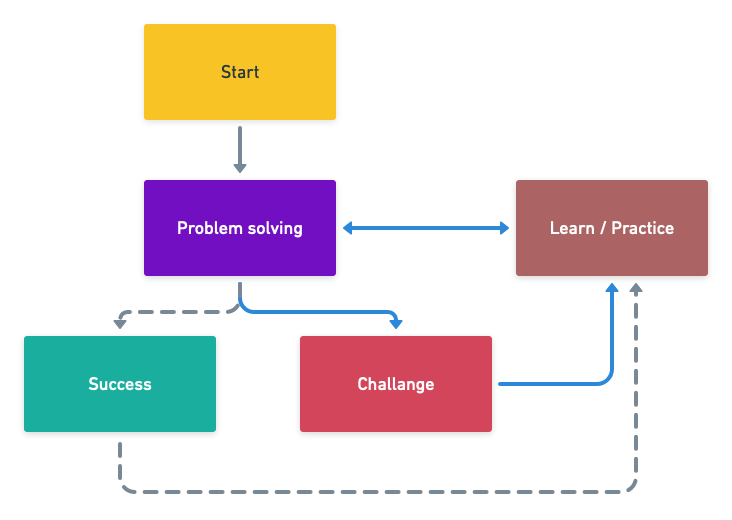
- Identify what you want to succeed at, and set goal that support this.
- Try: Research and apply solutions, gaining knowledge from the things that don’t work and the things that do work (this is typically a cycle, not a one-off)
- Face many challenges - create your feedback loops
- Learn more and practice, practice, practice - aim to be a master at the problem you are solving
- Repeat steps 2, 3 and 4 until you succeed (and continue to succeed if applicable)
- Move on to the next thing
I'm sure your saying to yourself, but this is the same as the learning cycle! And your right, it is! If you can learn something, then you can succeed at something - it's that simple.
To scale this model to a large problem, it's important to understand that there is little to none ‘overnight successes’ - it's a fantasy we like to play out while we work boring jobs, but for most people there is a long 10 years or so of facing challenges, trials and “failures” before they have a huge success. And those who suddenly do have a huge success early on usually don't have the maturity or capability to deal with it, so it doesn't last or it can be quite damaging to their life.
Also you should note that this process doesn't 100% guarantee the success you seek, opportunities are hard to figure out or everyone would be wealthy - but no work 100% guarantees failure. So not much of a choice really is there.
What learning feels like for me
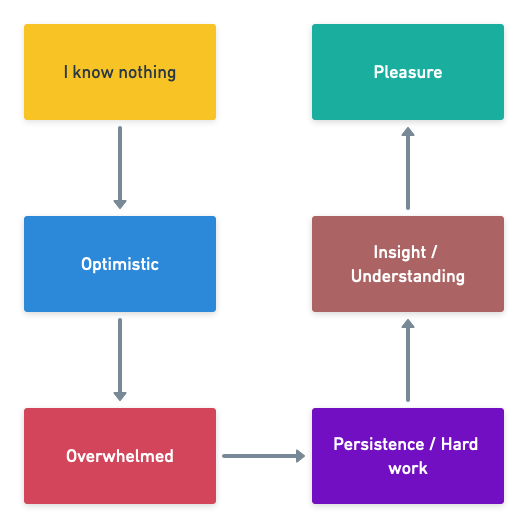
- I know nothing: but I know what I want to learn
- Optimistic: You have your goal, i know where I want to go - the hard part is over right? Dive in!
- Overwhelmed: Oh boy! Where to start? So much information to take in and language to learn. I'm confused, scared and afloat out at sea. Help!
- Hard work and persistence: You probably feel inadequate, humble, stressed and concerned - how are you ever going to learn this? But you knuckle down and work through the steps of learning a topic. Memorize, practice and continue to change your point of view until you start to build models of how it works.
- Have real insights, understandings and make connections. Exciting and relieving at the same time. Ok, I think I get this, now what happens if I do x, y should happen right?
- Experience pleasure at learning and understanding something. Overcoming a challenge always makes you feel good and strong in yourself. I can do this!
I purposely drew this in a “U” shape, because that’s kind of the journey you take: You dive down into the murky depths of the unknown, search for treasure on the seafloor and then struggle back to the surface, returning with knowledge stolen from the gods.
Summary
I have observed that everybody who succeeds in life, lives and breathes a version of this simple process and understands that it’s not exceptional, exclusive or something you’re born with - it’s just simple discipline, hard work and persistence. Simple that it maybe, it still amounts to a colossal amount of work and effort, so I'm not saying that it's easy - just that it's very possible. Of course you can explore and push this far beyond my simple explanation of it. But even then, this is still the heart of the process.
For me, this is one of the core teachings that I think everybody needs to clearly understand so that they can face their future, which is mostly unknown, from a place of strength and confidence in their own ability to adapt with it. And once you truly understand this process, you can learn to recognise what stage you are in and you will no longer see challenges or failures as particularly negative experiences - but rather, just as part of the process. And that you can even end up enjoying those parts too.
The final thing I wish to deeply impress on you is that for me, this is a fundamental key to my happiness and well being. I know that by doing this process it makes me feel good about myself and ultimately, happy. And I have observed that most people are the same to varying degrees, they just don't think about it very much - so please share this with the people you love. Teach it to your kids, observe (and enjoy) it in others and talk about it with your friends - and by doing so, maybe we can all bring a little more happiness and self understanding to the world.
Happy learning! x